The oligarch’s hometown – the founding legend of the Georgian Dream
First Published 14.03.2019
The city of Sachkhere in western Georgia, home to the oligarch and leader of the ruling party Bidzina Ivanishvili, will be set as a model for “what kind of Georgia we want to see in the near future.” This was stated on September 21, 2020 by the Prime Minister of Georgia Giorgi Gakharia, nominating a majoritarian candidate from the ruling Georgian Dream party in the city of Sachkhere.
This statement by the prime minister caused a great resonance. “What are the ambitious plans of our government,” write Facebook users.
What exactly is happening in Sachkhere? What model of development does the head of the government want for the country – in a JAMnews report from the oligarch’s native village, prepared in March 2019. Apart from the weather, nothing much has changed there since then.
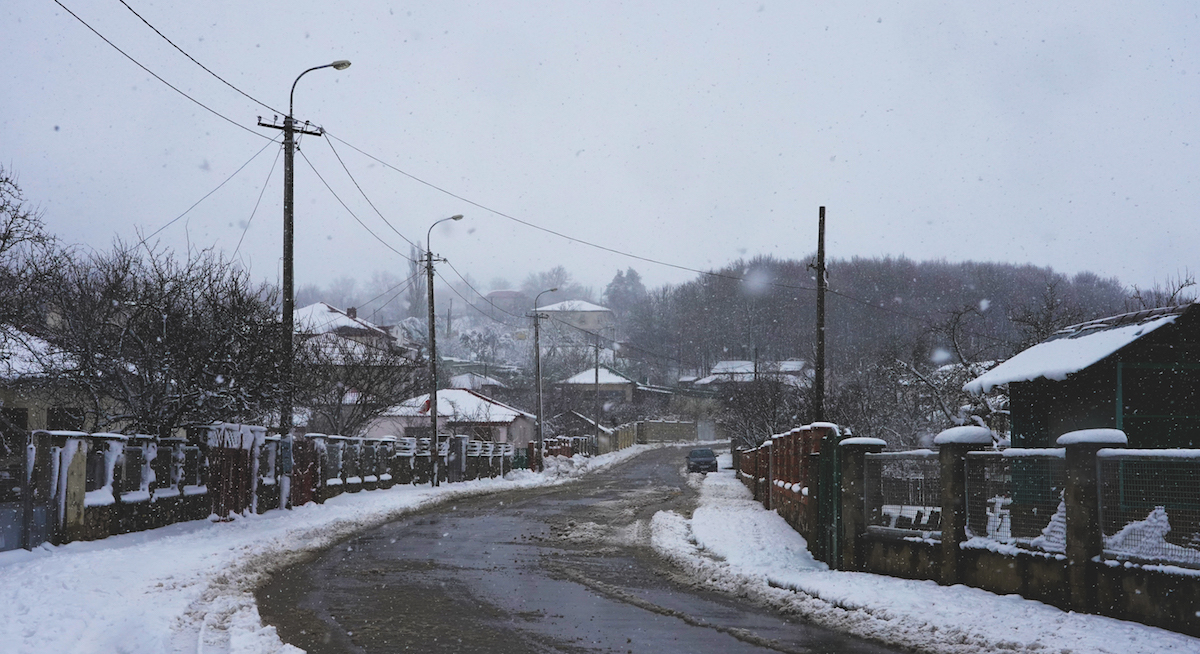
A tattered announcement was stuck to a fence calling villagers to a general assembly.
At the gathering, the villagers themselves were to decide what they needed more: a recreational park or a children’s entertainment centre.
“Will you go to the meeting?”I asked a woman near a produce shop.
“They’ll decide without me anyway,” she responded.
Chorvila, located in the Sachkere municipality of Georgia, is located 166 kilometres west of Tbilisi. The small town is home to about 1,500 people.
One could say this is the only village in the country whose residents don’t need to concern themselves with the resolution of their problems.
• Centuries old trees – the billionaire’s latest temptation
• Former Prime Minister of Georgia returns to politics
• Op-ed: The fight for Bidzina Ivanishvili
For example, when the topic of renovating the village was raised, local residents were only asked what colour they liked better for their roofs – green or red.
For many years this village in the poor region of Imereti in western Georgia has been shrouded in legend. And this is understandable: the former prime minister of Georgia and richest man in the country was born here – Bidzina Ivanishvili.
People in Chorvila usually speak of him in a whisper and with caution, especially in the presence of journalists.
For five years now, Bidzina Ivanishvili has left the post of prime minister.
In 2012, he unexpectedly defeated Mikheil Saakashvili’s United National Movement in the parliamentary elections, after the latter had led the country for nine years. At the time, he made the impression that he and his party, the Georgian Dream, were invincible.
After resigning from the post of prime minister in 2013, Ivanishvili did not show his face in politics for quite a while, and only resurfaced in April of last year.
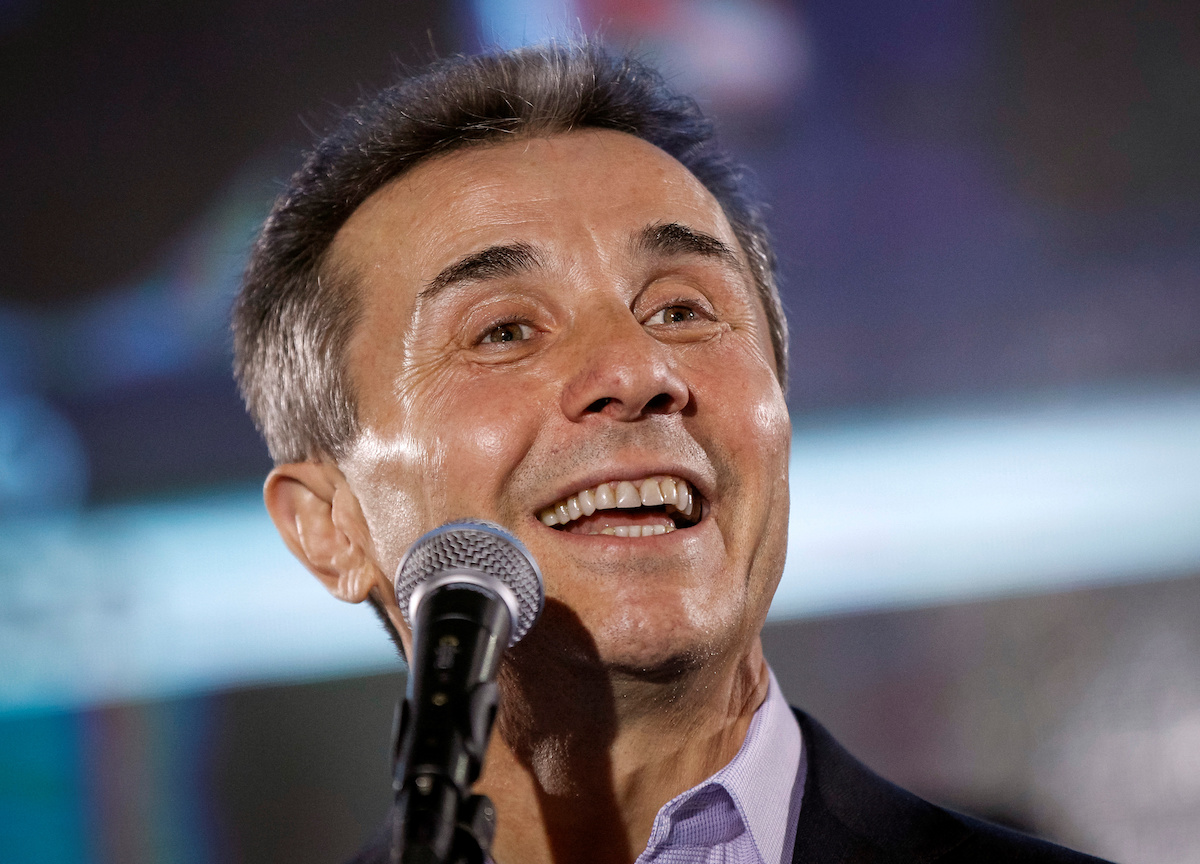
Now, Ivanishvili is the chairman of the ruling Georgian Dream party.
Though he formally does not occupy any official position in government, he also no longer cuts the figure of an oligarch surrounded by a veil of secrecy, which was the case before his entry into politics.
However, nobody doubts that he is the informal ruler of Georgia, and that he is personally responsible for tackling the country’s important political issues, including who should be the prime minister and who the president.
Ivanishvili owns large estates in Chorvila. His house is partially surrounded by a wooden fence, and partly by a stone wall.
There is a helipad in front of his home.
Ivanishvili often comes to his village even today, but locals rarely see him themselves, guessing his arrival or departure by the sound of his helicopter.
A paradisal oasis
Ivanishvili has been in power since the October elections of 2012.
We went to Chorvila to find out what has changed since then, given that at one point, all of Georgia was envious of this village.
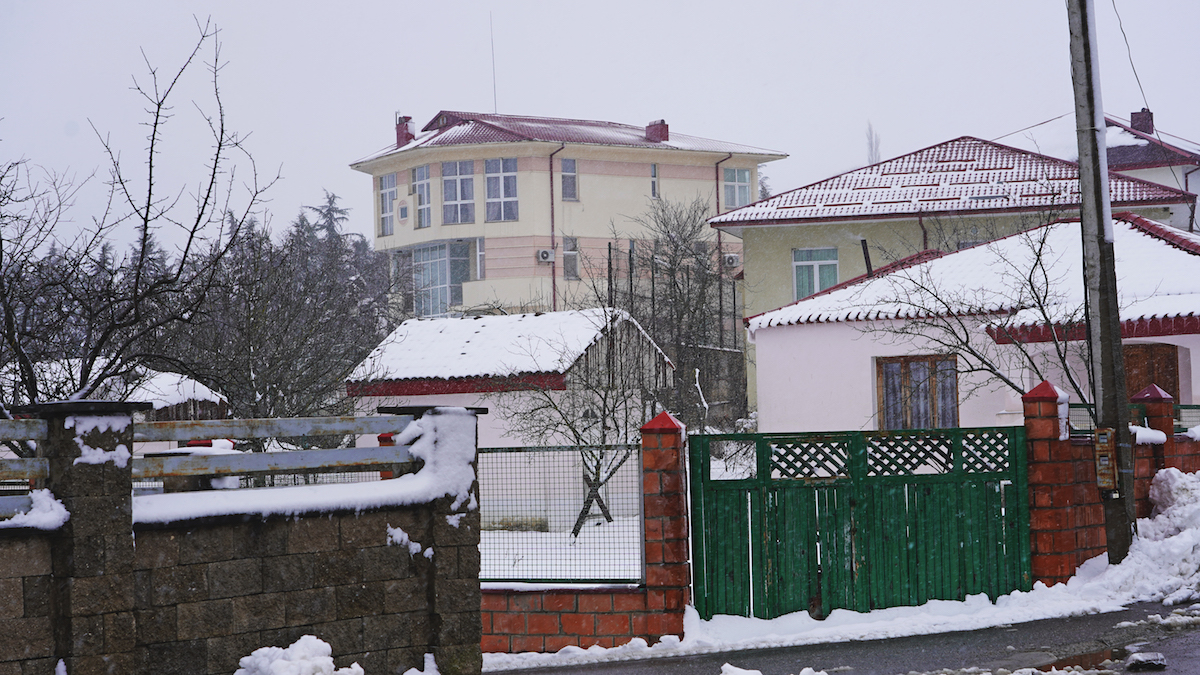
“Chorvila is the most European settlement in Imereti.”
“In Chorvila we have socialism!”
“Bidzina did in Chorvila what the Soviet government constantly promised the people, but never came through on!”
“Ivanishvili will do throughout Georgia as he has done in Chorvila!”
These are some of the things people used to say about Chorvila up until 2012, with many of the myths surrounding Ivanishvili even turning out to be true.
Chorvila, with its wooden fences, is more like a Swiss village than a Georgian one. The houses have been properly rebuilt and the roads are well maintained.
Upon entering the village, red roofs alternate with green ones.
However, our car was not prepared for snowfall, and stopped at the very entrance to the village. We continued on foot.
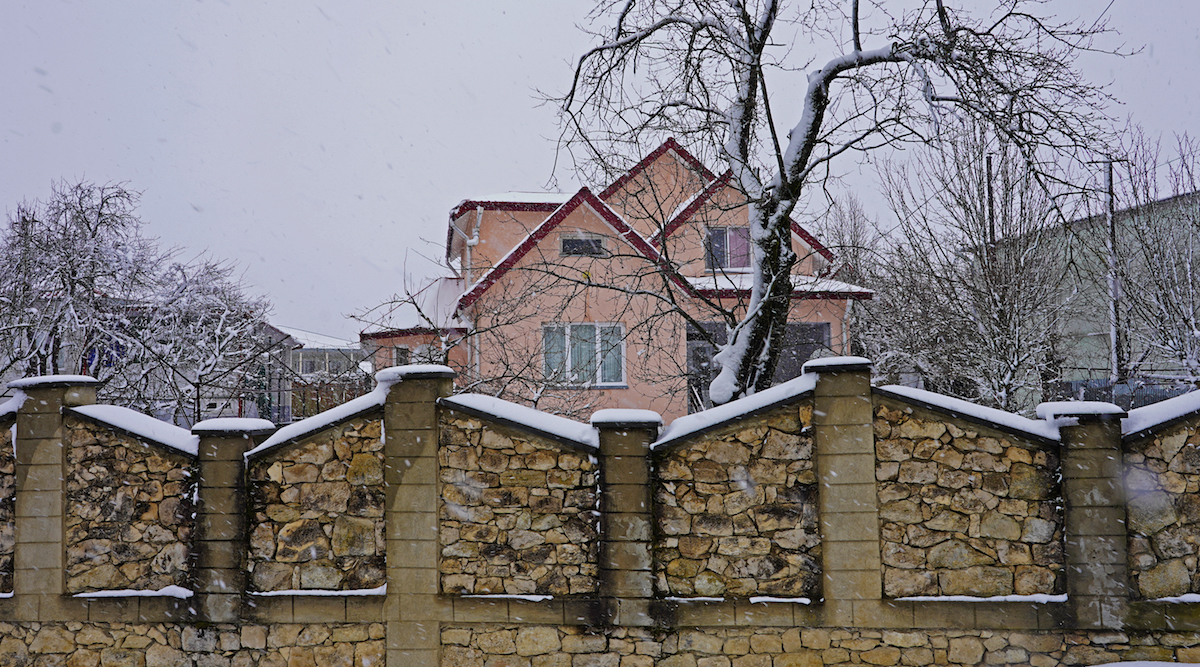
An unsuspecting passer-by, Temo, became our guide after we asked him to take us to the centre of Chorvila. However, his name wasn’t Temo: residents of Chorvila, like their main benefactor, have preferred anonymity to publicity in recent years.
“I do not need a headache, my dear. Let’s just say they don’t like journalists here,” Temo says.
We soon learned this ourselves.
We stopped at a number of courtyards, and called out home owners to see if they’d be willing to talk to us.
Famous Imeretian hospitality is not extended to journalists here. We noticed how in some houses, the owners carefully peeped out from behind their curtains. In others, only dogs responded to our calls. Gates did not open, and nobody was inviting us in.
We had to ‘catch’ people on the street.
The legend of Chorvila – its beginning and end
One middle-aged woman we spoke to has a small store in the centre of town. She knows Ivanishvili since her elementary school years.
“He’s younger than me, but we know each other. He has supported his classmates. He has given out family allowances to the entire block,” she says, carefully trying to avoid the video camera.
Everybody here says that most Georgian villages would have a tough time of even dreaming what was done up to 2012 in Chorvila.
A new school was built with Ivanishvili’s help, and a free hospital in Sachkere. Homes were rebuilt and built from the ground, teachers and doctors were given bonuses on top of their regular salaries.
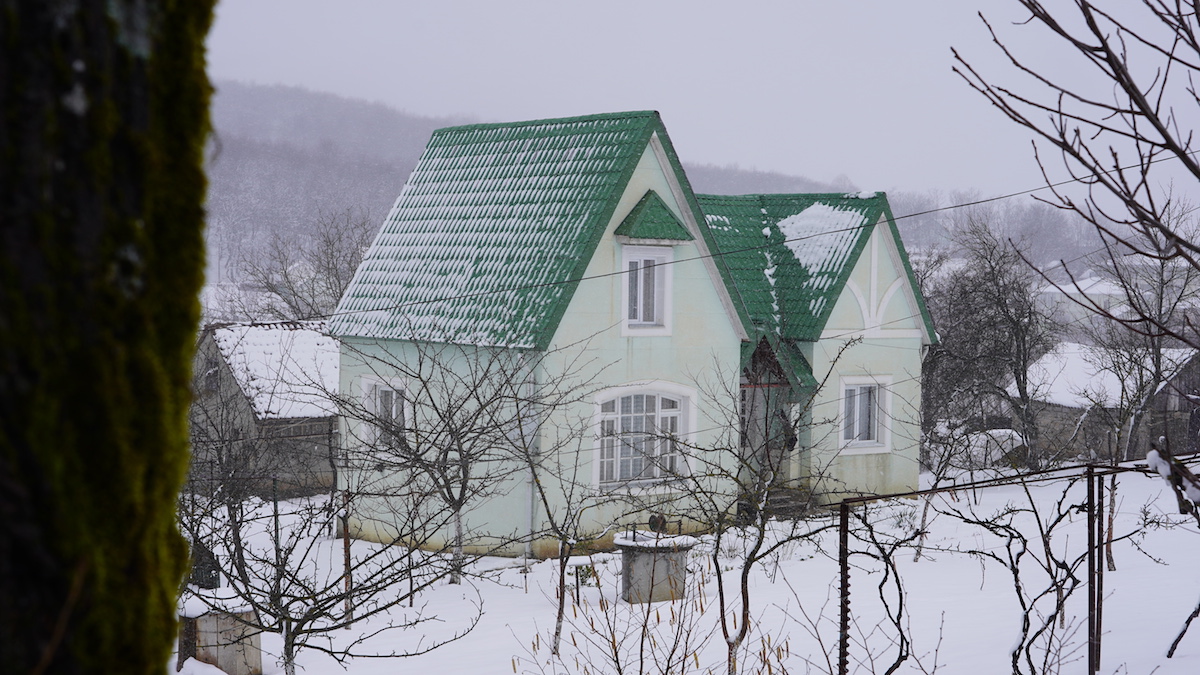
Local residents didn’t pay for gas. They received free gas heaters, televisions and refrigerators. The refrigerators themselves were filled with goods – also bought on Ivanishvili’s dime. This wasn’t given just to select residents, but to all families in Chorvila.
The fairy-tale came to an end in 2012.
Today in Chorvila there is no free gas.
Teachers and doctors do not receive bonuses.
The ceremonial hall, built by Ivanishvili and which used to serve Chorvila residents free of charge during funerals and weddings, started charging a fee several months ago.
Basic services in the Sachkere hospital were free up until 2012 for Chorvila residents – now, these privileges have been revoked.
Up until 2012, Ivanishvili gave all the villagers in Chorvila money. Now, he only gives money to the local kindergarten, which was renovated three years ago.
Why have things changed?
Locals name several reasons.
One account – per the billionaire’s closest neighbor, an older man named Guram – has it that it was Saakashvili who forced Ivanishvili to stop helping Chorvila residents. He blames the ex-president for this:
“Saakashvili asked him [to stop] because [in other regions] many were unhappy with the fact that teachers’ salaries [in Chorvila] were increasing. He [Ivanishvili] stopped giving out money so that nobody would be offended.”
Guram also said that Ivanishvili still cares about the village, and that he has his ‘own people’ in the village that monitor everything that happens and tell Ivanishvili who needs what.
The Kapanadze family received its first gas bill six years ago.
Almost at the same time, the head of the family, a teacher, stopped receiving his wage supplement, and the family’s expenses rose sharply.
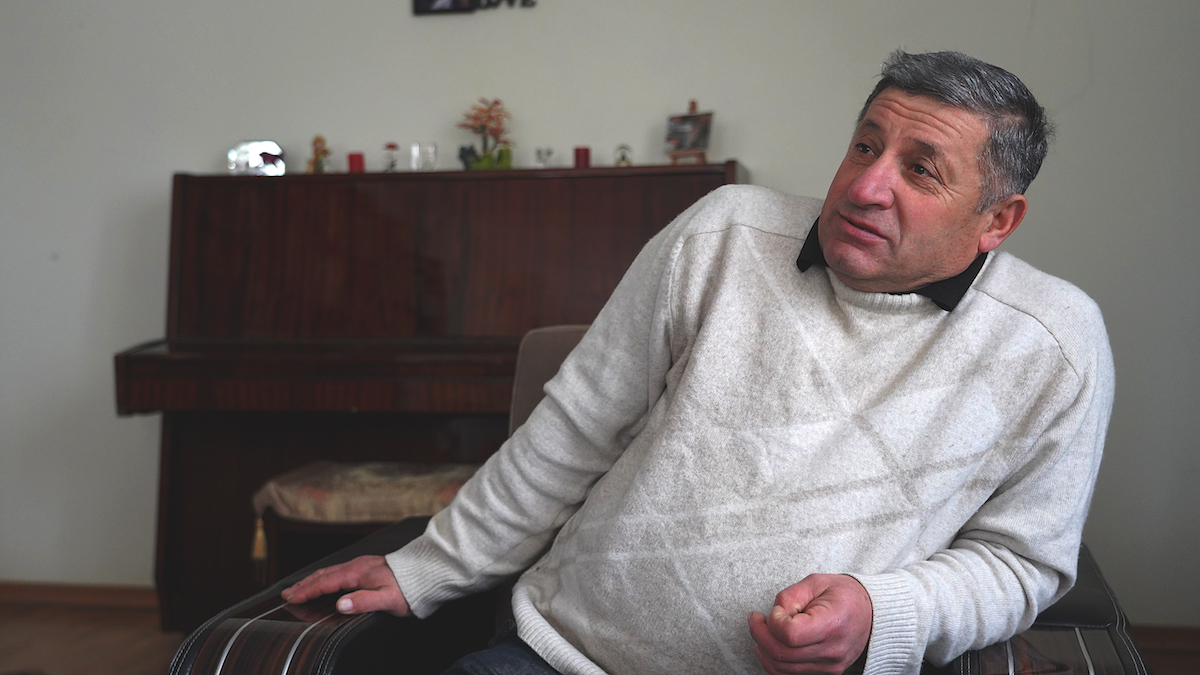
Temur Kapanadze has his own version about what happened to Ivanishvili’s generosity. He blames Chorvila residents themselves for the fact that they no longer enjoy the life they used to.
“Whether it was necessary or not, the lights were on all the time here, around the clock. [I swear the village Chorvila] was consuming as much electricity as the whole city of Rustavi. I myself have seen more than once how people would turn on the heaters, and at the same time open the window! Well, for how long could this go on? A person who knows how to earn money knows the price of money,” Temur Kapanadze said, not without a hint of irritation.
Kapanadze is the only person we spoke to who invited us into his house and allowed us to film whatever we wanted.
His house, like the others, was also built with Ivanishvili’s money.
Kapanadze took out a carefully stored school album. In it is a photograph from a school trip. In the photo, one can see Kapanadze and the future billionaire.
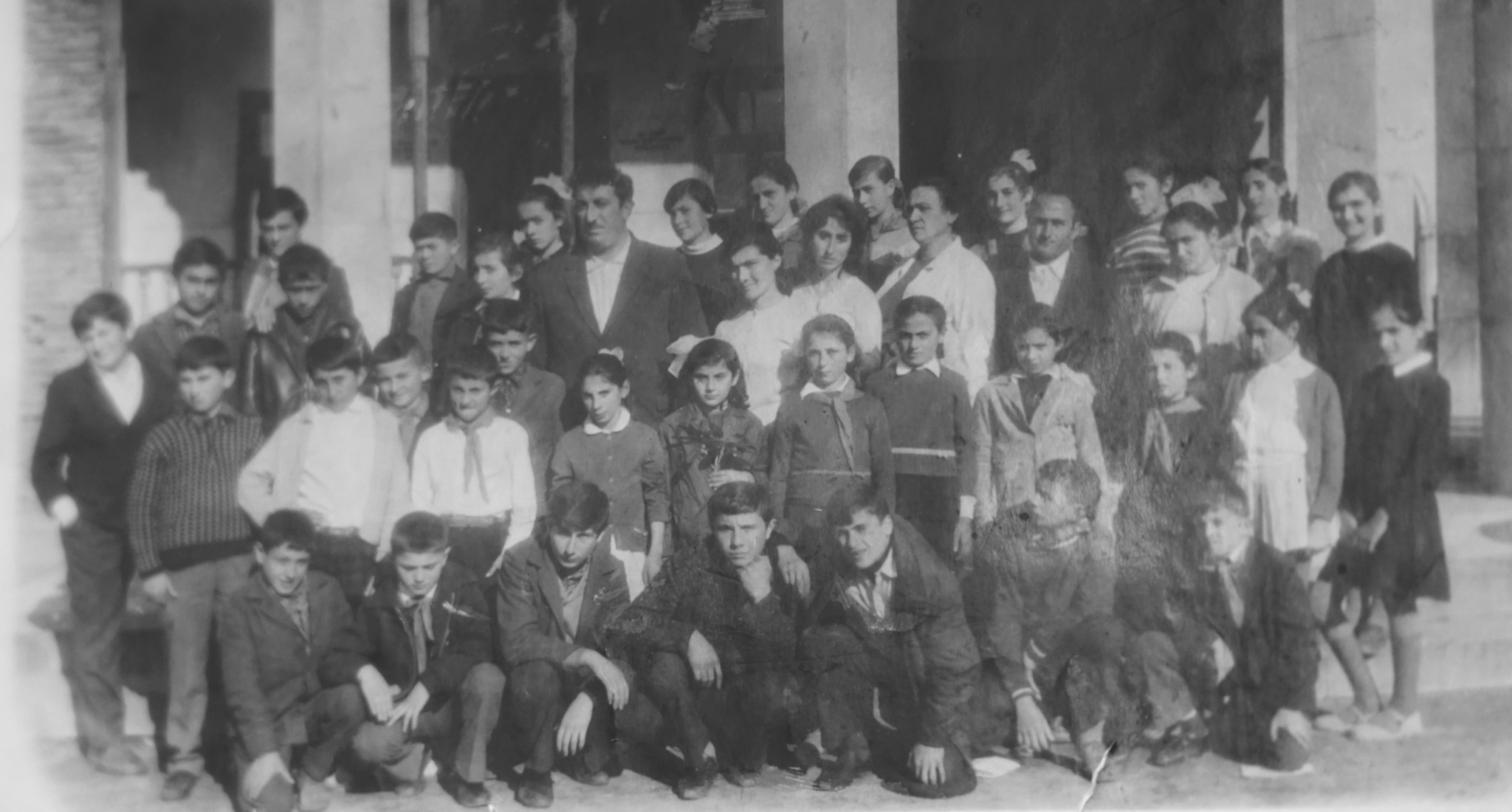
The ‘palace of rituals’, built by Ivanishvili, is a topic for an entire conversation.
It is a modern glass building, where, for several years, the residents of Chorvila celebrated weddings, birthdays and held funeral ceremonies. They could use the hall for free.
Moreover, all newlyweds received $3,000 from Ivanishvili. Here, locals even joked that for this reason alone, there are no single or unmarried people in the village.
Today, the services of the ceremonial hall have to be paid for. In just a few days, the first “paid” wedding took place here.
A anonymous passerby said this event was preceded by an enormous scandal.
“Some of the [ceremonial hall’s] funds were stolen. Therefore, the director was fired. Ivanishvili knows how to punish, and people should be aware of that,” says the woman, imitating handcuffs on her arms to convince us of the veracity of her story.
Today the building is municipal property and is leased.
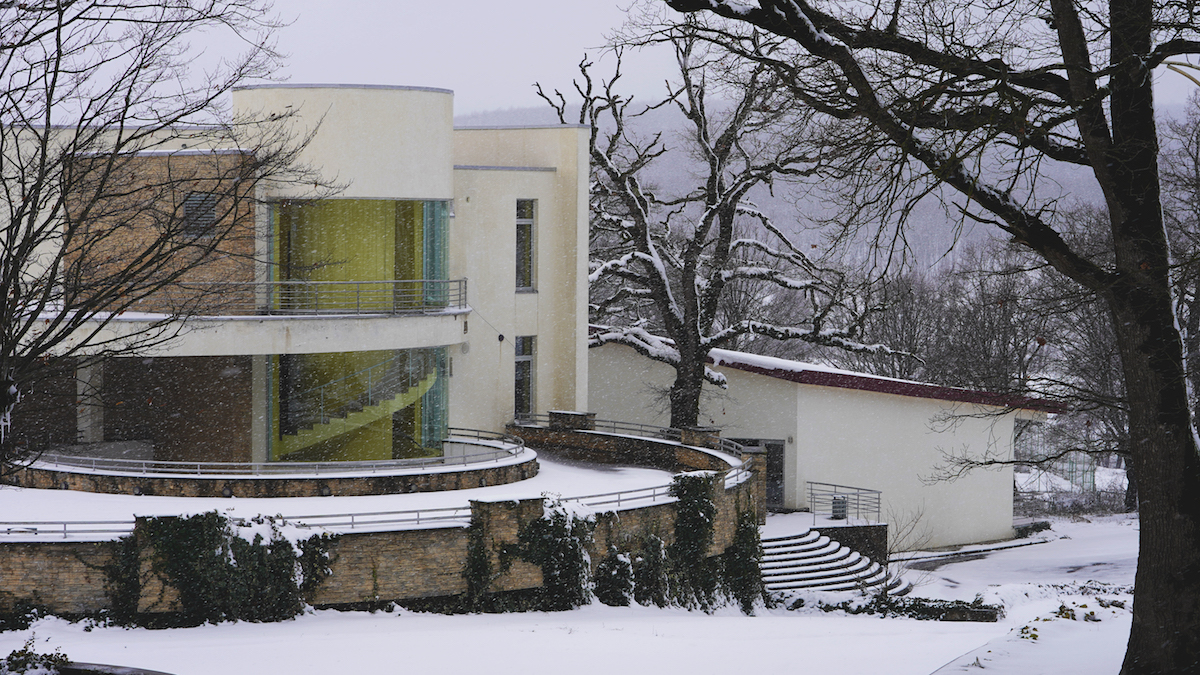
There are no benefits for Chorvila residents in the form of free services at the hospital in Sachkhere, built and equipped according to modern standards.
Rural doctor Inga Kapanadze avoids talking about how things changed after 2012, and is grateful to Ivanishvili for everything that took place before.
“Thanks to him alone, there is a well-equipped out-patient clinic in Chorvila, where two doctors and three nurses work,” says Inga Kapanadze.
Since 2012, the most visible example of Ivanishvili’s charity in Chorvila is a football field and a kindergarten that was renovated with his money in 2017.
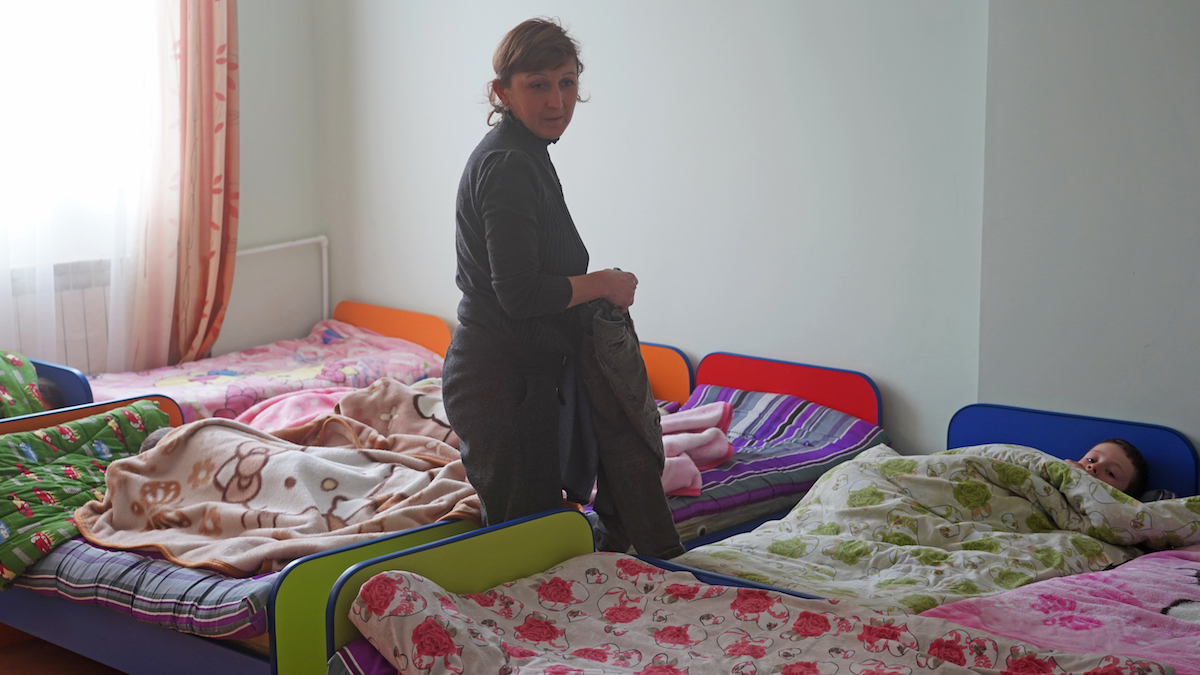
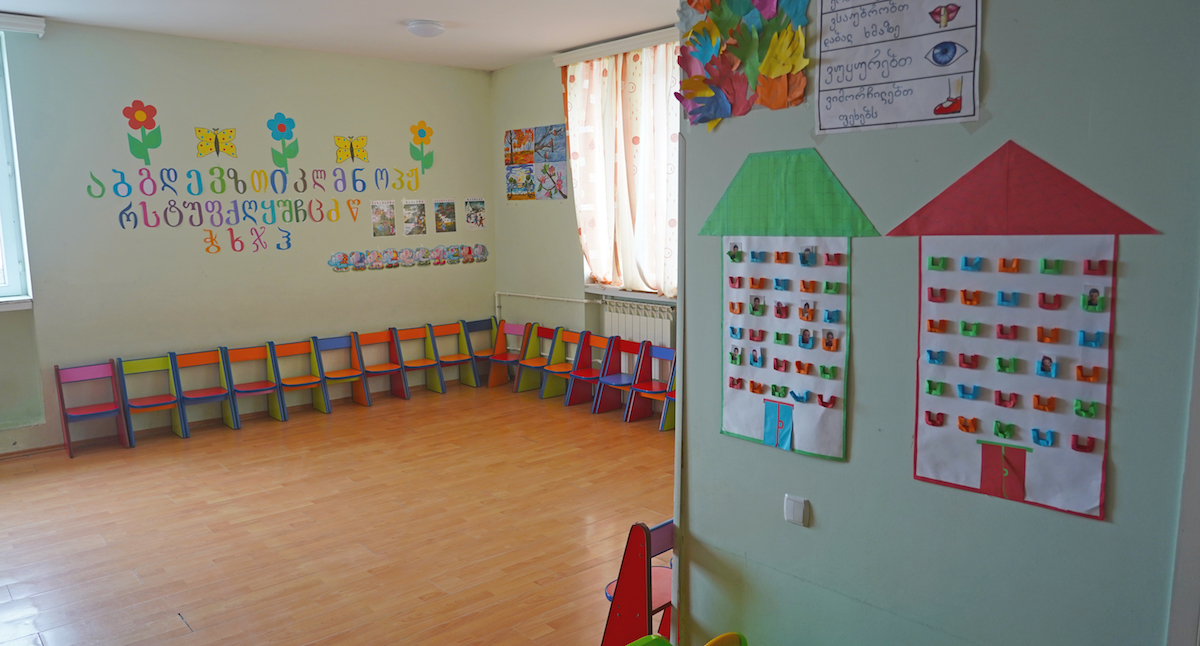
While the children were sleeping, the head of the kindergarten showed us around, and spoke with love and appreciation about the bright rooms sparkling with cleanliness.
“Tears come to my eyes when I hear such unworthy conversations about such people,” says Lali Makasarashvili. She hates it when Ivanishvili is criticized.
A master of illusions
“Who doesn’t like to sit in the shade when it’s hot out?!” one local said about Ivanishvili’s hobby of collecting centuries old trees.
Being in the shadows was, for some time, the most comfortable position for Ivanishvili.
In 2008, when journalist Wendell Stevenson was working on a bio of Mikhail Saakashvili for Prospect magazine, the ex-president said during an interview:
“Ivanishvili is like the Count of Monte Cristo: I have seen him only once. He has no political ambitions. No, none at all.”

Everything changed on 6 October 2011, when Bidzina Ivanishvili announced the creation of a political party.
A few days later, in his “glass palace” towering over Tbilisi, the doors opened to politicians and journalists. He gathered practically the entire Georgian opposition under his wing, from pro-Western leaders to pro-Russian parties.
At the time, Chorvila played an important role.
“Ivanishvili will turn the whole of Georgia into Chorvila” – this was the message that got out about the paradise that would come to the country if Ivanishvili won the elections with his new party.
This village, Chorvila, which had become mired with legends, contributed to the fact that voters believed the pre-election promises of the Ivanishvili team: 100 new factories, 5 million lari (equal to about $3 million at the time) for every village, a 2-time reduction in utility tariffs, reductions in gasoline prices and long-term loans with a maximum interest rate of three per cent.
As a result, the results of the 2012 parliamentary elections reflected the voters’ hopes that the whole of Georgia could be healed by the well-planned and idyllic life of the village of Chorvila.
“The real talent or trickery of Ivanishvili is that he created different illusions for various social groups,” says political analyst Ghia Nodia.
Nodia says that everyone got their share of illusions from him – both those who kept their path focused on the West and those who grieved over the shattered relationship with Russia. Minorities listened to arguments about equality, and homophobes supported him for talking about respect for traditions.
“Most of these illusions were neither compatible with each other nor related to each other, but they worked. Chorvila is a reality, but as a model it is an illusion,” Nodia says.
In 2011, David Zurabishvili and his Republican Party were among the first to receive an invitation from Ivanishvili to join his coalition. Zurabishvili today confesses that Ivanishvili managed to “deceive” him.
“Over time, when I got to know him better, I realized that even though he says the right words, he puts a completely different meaning into them. For example, when he says that “society must control power,” by society he means himself – personally,” Zurabishvili said.
Georgian Dream’s problems
The most difficult period for Ivanishvili has been the seventh year of his party’s rule.
He almost lost the presidential elections for his personal candidate, Salome Zurabishvili. To win, it took a second round and Ivanishvili’s unprecedented support.
Ivanishvili, who over many years had mastered the “power of charity” and learned to draw political dividends from such activities, had to resort to extraordinary measures: in the run-up to the second round of the elections, the Cartu Fund paid the debts of Georgians who were blacklisted, which had prevented them from taking out additional loans due to their inability to pay off their current ones.
In its report on the elections, the OSCE called this “voter bribery”.
But the crisis in the Ivanishvili team continues.
The ruling party is slowly falling apart, with small groups and individuals leaving its ranks. Georgian Dream has already lost its constitutional majority in parliament.
Nodia says there will be more crises similar in nature in the political life of Ivanishvili, since he himself has become one of the victims of his illusions, having placed his bets on the idea that he would be able to rule Georgia as one might a company – a Georgia Ltd.
“He acquired a 51% stake in the company which is called Georgia. He appointed Irakli Garibashvili (former Prime Minister) as manager. When he disliked him, he replaced him with the manager Kvirikashvili, then manager Bakhtadze (the current prime minister), but in fact he does not trust anyone at any stage. He is sure that he himself is not mistaken in making decisions, but those who should carry them out do not carry out his decisions [correctly].”
***
It was already evening when we left Chorvila. We offered our guide a fee for the time he spent on us and for fuel.
“Let me at least in this good deed be like Bidzina,” he replied, refusing our money.


















